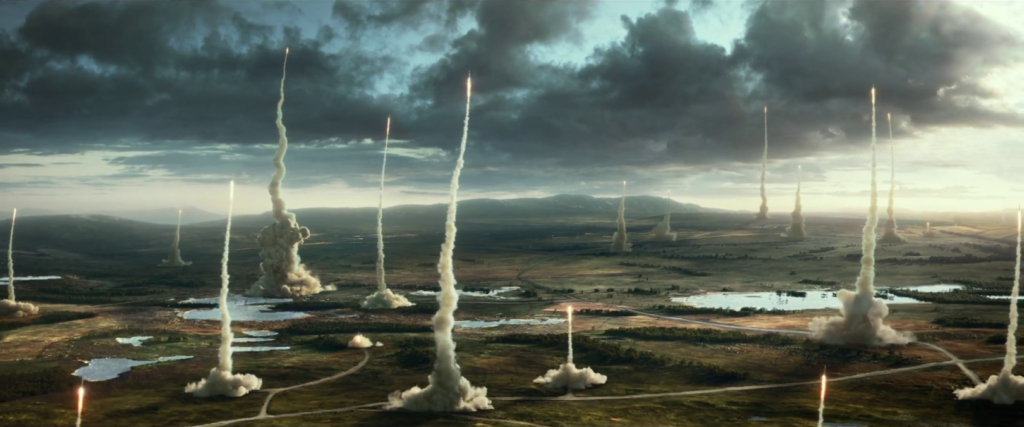
x-men apocalypse, from trailer gallery
The poor reviews of Maze Runner: Death Cure, the final installment in the trilogy, have lead some to ask whether the genre has finally reached maximum entropy. (The film currently has a 44% rating on Rotten Tomatoes.) In Brutal ‘Maze Runner’ Reviews Prove People Are Over YA Dystopias the folks at Inverse seem intent to write the epitaph for the genre.
It’s the end of the ‘end of the world’ stories as we know it, because the dismal reviews for the latest Maze Runner movies might just indicate that the dystopian YA bubble has officially burst. We’re all in the apocalypse now.
Hunger Games, Divergent, and now Maze Runner. Hollywood hasn’t tired of dumping millions into adapting young-adult fiction series to the big screen, but at long last audiences are seemingly over the trend once and for all. The third and final Maze Runner film, The Death Cure, came out on Friday and with it came a slew of overwhelmingly negative reviews.
Apparently, declaring the official bursting of the YA dystopian bubble was a little premature, as the Maze Runner sequel was the number one box office draw this weekend.
So much for doomsday.
The dystopian genre — in both adult and YA — has maintained a fairly perennial appeal. Hulu’s The Handmaid’s Tale, adapted from Margaret Atwood’s cautionary near-future New England, in which a totalitarian, Christian theonomy has overthrown the United States government, recently racked up both Emmy and Golden Globe awards. In late March, Stephen Spielberg’s adaptation of Ernest Cline’s Ready Player One, a YA/dystopian hybrid, releases. And after the 2016 presidential election, George Orwell’s 1984 experienced a surge of re-interest.
There’s been much speculation as to why dystopian tales maintain continued appeal. On the YA front, NPR’s Elissa Nadworny described it in terms of teen angst. In Why Teens Find The End Of The World So Appealing she writes,
Teen readers themselves are characters in a strange land. Rules don’t make sense. School doesn’t always make sense. And they don’t have a ton of power.
Whether it’s facing curfews, not being able to drive, or grappling with “ethical grey” areas, teens tend to live in a perpetual dystopia. Even more, “dystopian fiction [is] perfect for the developing adolescent brain.” Referencing Laurence Steinberg, a psychologist at Temple University, Nadworny adds.
“Their brains are very responsive to emotionally arousing stimuli,” [Steinberg] explains. During this time, there are so many new emotions and they are much stronger than those kids experienced when they were younger.
“When teenagers feel sad, what they often do it put themselves in situations where they feel even sadder,” Steinberg says. They listen to sad music — think emo! — they watch melodramatic TV shows. So dystopian novels fit right in, they have all that sadness plus big, emotional ideas: justice, fairness, loyalty and mortality.
So teens gravitate to dystopian tales because they are bleak. The sadness they find in such stories resonates with the emotional landscapes of their own lives.
Others frame the ongoing popularity of dystopian tales in terms of politics. Indeed, the article at Inverse is careful to remind us, “We’re all in the apocalypse now.”
It’s hard to argue with Peter Travers writing for Rolling Stone when he wonders, “why imagine terrible futures when we have Trump to remind us that the end of the world is coming?”
Some called it the “Trump Bump,” writing that Sales of Dystopian Novels Have Been Spiking on Amazon Since the Election. Either way, this isn’t the first time an election has led to gloomsayers bemoaning the inevitable approach of Armageddon (which, of course, could have been averted by voting for THEIR candidate).
There is, however, another possible reason for the ongoing popularity of dystopian stories, one that hearkens to and reinforces a vital biblical theme.
Maybe more than any other genre, dystopian tales remind us that Man is broken. History and experience bear this out. Dystopia far more accurately reflects the human condition than does utopia.
The Bible does not paint a pretty picture regarding the fate of mankind. Utopia — if Heaven or the New Earth can be called that — only comes about after much travail. If the Book of Revelation is to believed, Earth 1.0 doesn’t End with a whimper, but in blood and fire and plague. All of our diplomacy, peace treaties, technological advances, therapeutic skills, and Kumbaya/We Are the World hand-holding idealism still lands us in Armageddon. The Fall inevitably leads to a Big Crash.
Perhaps one reason for the perennial popularity of dystopian stories is that we inherently intuit the arc of human history; it is both a rejection of utopia and the notion of inherent human goodness. History and personal experience have shown us, over and over again, that when left to his devices Man fails. Empires collapse. Lovers divorce. Technology glitches.
Dystopia is an admission of depravity, brokenness, and moral malfinction.
Of course, the popularity of the YA dystopian genre may not mine those exact theological points. Nevertheless, the genre as a whole appeals to a nagging sense that no earthly power can save us from ourselves. Thus, we gravitate to stories about bleak futures not because we are pessimists, but because we know our own hearts. And knowing our own hearts renders a utopian future pure fiction.















Good thoughts, Mike. I think another reason dystopian novels have such a long shelf life is because they are such a pure “what if” testing ground. What if all books were banned? What if children had to fight like gladiators? What if communism was the law of the land everywhere? Okay, let’s run with that and see where it goes…
The Trump thing has something to do with it, for sure. If people are told the world is crashing, it’s self-medicating to read how characters would deal with an in-universe, exaggerated version of it. Sympathy through literature.